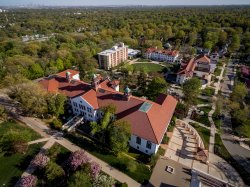Key differences Between High School and College
Legislation
One of the main differences is that the laws governing provision of services to students with disabilities change. In high school, students were guaranteed a “free” and “appropriate” education under the Individuals with Disabilities Act (IDEA). In college, education is no longer considered a right; students who are “otherwise qualified” are ensured “equal educational opportunity”. The Americans with Disabilities Act (ADA) and Section 504 of the Rehabilitation Act of 1973 ensure ACCESS to facilities, programs, and services; they do not guarantee SUCCESS.
Advocacy
One of the biggest differences is in the area of self-advocacy. Students must self-identify to our office. They are expected to initiate contact with professors at the beginning of the semester, and present Accommodation Request Forms outlining their requested accommodations. The DRC does not “notify” professors about students with disabilities in their courses; it is essential that students pick up this form from our office every semester, and advocate for themselves. The skills of self-advocacy should be practiced as part of the transition process.
To Disclose or Not Disclose?
Many parents wonder whether a student should disclose his/her disability when applying to the University. The University does not ask disability-related questions of its applicants, nor will it solicit documentation before admission. However, many students choose to disclose and/or document their disability as a way of explaining academic challenges or inconsistencies. If choosing to disclose at the time of application, we recommend providing a Personal Statement or essay as a supplement with your application. Do not provide the IEP/ISP, 504 plan or any documentation with the application.
While some consideration may be given for extenuating circumstances, academic standards related to University admissions criteria will not be waived due to disability.
Why Register for Services?
Many incoming first-year students with disabilities think that college is a time to “start fresh” and “do it on their own”. They may have disliked being “labeled” in high school, or they did not want their friends to know they have a disability. In college, no one knows a student has a disability unless the student discloses or signs a release permitting us to disclose on their behalf. There are no “special education” courses in college. Students have become accustomed to certain kinds of accommodations such as extra time for tests, and unless they formally register with the DRC, they will not be permitted to use those accommodations in college. We encourage students with disabilities to register because it is not advisable to begin their college endeavors at a disadvantage.
Does Montclair State University have a learning disabilities program?
No. The DRC is a full-service office designed to provide accommodations to which students with disabilities are legally entitled, as well as some services that go beyond the legally mandated accommodations, such as specialized academic advising and peer mentoring and support.
However, the DRC is not designed as a comprehensive support program. We do not require that students come in to meet with us; that is their choice! We do not monitor students’ progress in their classes. We do not provide ADD “coaching”. We can, occasionally, provide some tutoring; however, the University offers tutorial services through the Center for Academic Development and Assessment and writing assistance through the Center for Writing Excellence.
Does the DRC provide testing?
The DRC does not provide learning disability evaluations. It is advisable that students in high school have a complete evaluation in their senior year. If documentation does not meet our guidelines and further testing is necessary, the cost of the testing is the responsibility of the student. The DRC can assist students obtain updated or initial evaluations from on and off-campus providers.
What Support is Available for Students with Asperger’s Disorder?
Like many colleges, Montclair State has seen an increase in students with Asperger’s Disorder or other Autism Spectrum Disorders in recent years. In response to this increase and the specific needs of this group, the DRC, in conjunction with Counseling and Psychological Services (CAPS), run a weekly support group. Participation in the group is optional. Interested students should inquire about the group with their DRC counselor.
